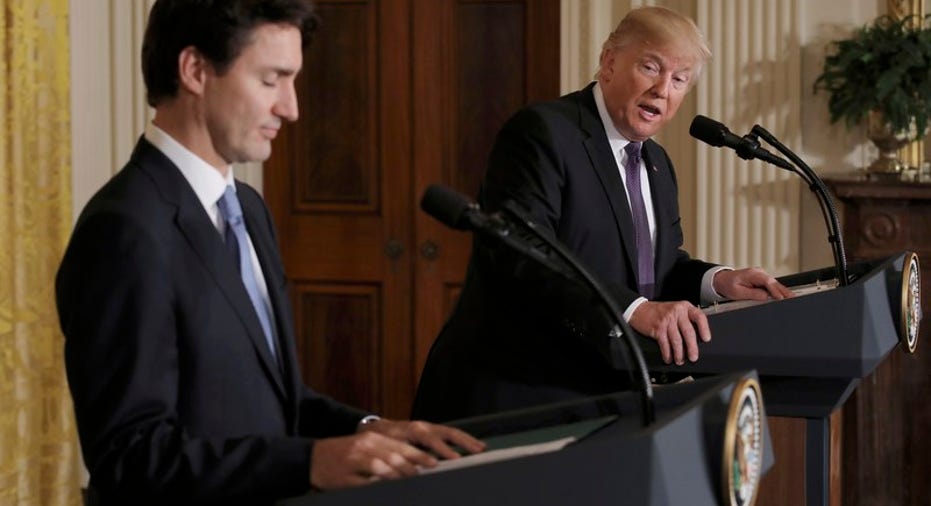Trump Expects Only 'Tweaking' of Trade Relationship with Canada

President Donald Trump said on Monday the United States will be "tweaking" its trade relationship with Canada, stopping short of calling for a major realignment in a development likely to please visiting Canadian Prime Minister Justin Trudeau.
Trump has pledged to renegotiate the North American Free Trade Agreement linking the economies of the United States, Mexico and Canada to make the terms more favorable to Americans.
At a joint news conference with Trudeau after White House talks, Trump said his biggest concern with NAFTA is the U.S. trade relationship with Mexico, which he has frequently accused of stealing American jobs.
"We have a very outstanding trade relationship with Canada. We'll be tweaking it," Trump said.
"It's a much less severe situation than what's taking place on the southern border. On the southern border, for many, many years the transaction was not fair to the United States," he said.
Trudeau carefully steered around questions about the Canadian trade relationship with the United States in what was his first meeting with the new president. He said he expected each country to always remain each other's most essential partner.
"There have been times where we have differed in our approaches and that's always been done firmly and respectfully. The last thing Canadians expect is for me to come down and lecture another country on how they choose to govern themselves," Trudeau said.
Trump's vow to renegotiate NAFTA has unnerved Canadian officials, even though he has singled out Mexico in his criticism of the free trade deal. Canada sends 75 percent of its exports to the United States.
Canadians have become more supportive of NAFTA since Trump's election victory on Nov. 8, a poll from the Angus Reid Institute showed on Monday. Forty-four percent of the 1,508 surveyed said NAFTA had benefited Canada, up from 25 percent from a poll last June.
Trudeau, when asked about Canadian firms' concerns about possible changes to NAFTA, said: "It is a real concern for many Canadians because we know our economy is very dependent on our relationship with the United States.
"Goods and services do cross the border each day...we have to allow this free flow of goods and services and we have to be aware of the integration of our economies."
Trudeau had a strong rapport with former Democratic President Barack Obama, prompting pundits to describe their relationship as a "bromance."
Soon after Trump put a hold on allowing refugees into the United States and temporarily banned travelers from seven Muslim-majority countries in an executive order on Jan. 27, citing the need to head off attacks by Islamist militants, the Canadian prime minister took to Twitter to say refugees were welcome in Canada.
'POLICY OF LAYING LOW'
Still, analysts said Trudeau has strong incentives to build a relationship with Trump given rising anti-trade sentiment.
"You don't have to be a genius to see there are some stark differences between them," said Duke University professor Stephen Kelly, former U.S. deputy chief of mission to Ottawa.
"But is this the time to be poking people in the eye? I would say it is not. ... In some ways the president is a guy for whom personal relationships may be even more important."
Canadian pollster Nik Nanos said Trudeau, who remains popular at home more than a year after winning a surprise Liberal majority government, faces the same pressure all Canadian leaders do when they engage with U.S. presidents: keep the economic ties tight but do not appear too chummy or subordinate.
Nanos expects that Trudeau, if asked, will speak about how Canada is welcoming refugees or seeking to expand free trade, without saying anything critical about Trump's point of view, conscious that the president has not hesitated to take an aggressive tone with other world leaders.
"This meeting is more about avoiding pitfalls than trying to engage on some of the big issues," Nanos said. "It's definitely the policy of laying low."
(By Andrea Hopkins; Additional reporting by Steve Holland in Washington and David Ljunggren in Ottawa; Editing by Jonathan Oatis and Grant McCool)



















